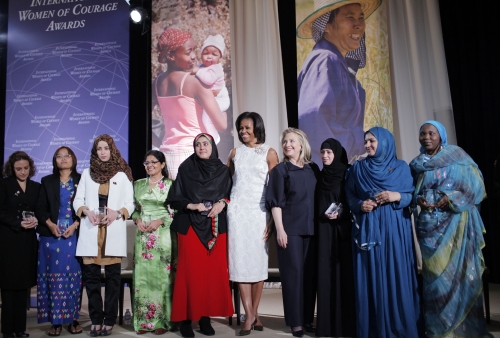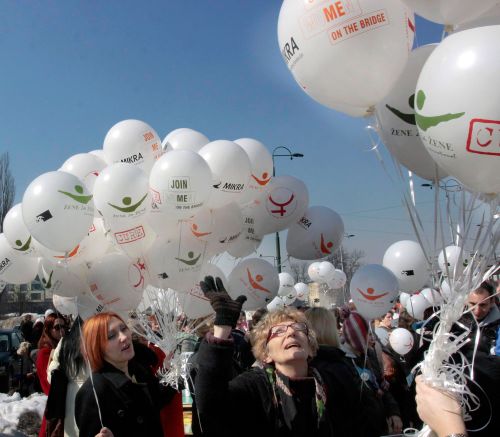UN women leaders on Thursday called for greater equality between the sexes as they marked International Women’s Day amid demonstrations and marches for female rights.
 |
Secretary of State Hillary Rodham Clinton and first lady Michelle Obama pose for a photo with the recepients of the 2012 International Women of Courage Award Thursday. (AP) |
“No country can claim to be entirely free from gender-based discrimination,” Michele Bachelet, a former president of Chile who heads the newly-created UN Women agency, told AFP in Rabat.
“This inequality can be seen in persistent wage gaps and unequal opportunities... in forced child marriage and also in continuing violence against women in all of its forms.”
She called for greater equality, especially in rural areas where inequality between men and women is “most marked,” saying progress would help reduce the number of malnourished children.
UN leaders proposed to hold, for the first time in 20 years, a world conference on women in 2015, citing “the importance and relevance of women’s issues for global progress.”
US Secretary of State Hillary Clinton welcomed “enormous progress” on women’s rights but warned that “challenges still remain.”
The exclusion of women from politics and the economy remains the norm around the world, said Navi Pillay, the UN High Commissioner for Human Rights.
 |
Actress Angelina Jolie attends the Women in the World Summit 2012, hosted by Newsweek and The Daily Beast, at the David H. Koch Theater March 8, 2012 in New York. (AP) |
Official statistics show that women held just 19.3 percent of parliamentary seats around the world last year. And on the economic front, just 12 of the world’s top 500 businesses are led by women.
Four out of five landowners are men, according to the Food and Agriculture Organisation, a UN body.
European Union Commissioner for Home Affairs Cecilia Malmstrom criticized the low number of women in European governments, while French euro-MP Sylvie Goulard noted that all European central bank directors were men.
In Europe, three women are heads of government -- in Germany, Denmark and Slovakia -- while men hold two thirds of seats in the European parliament.
In national parliaments, Sweden has the most women -- 44.7 percent -- while Hungary has just 8.8 percent.
Nicaragua’s parliament on Thursday unanimously approved a law requiring political parties to have women account for at least half of their candidates in municipal elections.
 |
Bosnian women release balloons as they mark the International Women's Day, in Sarajevo, Bosnia on March 8, 2012. (AFP) |
Several hundred women demonstrated in Sarajevo in favour of greater female representation in politics. Quotas say women should hold at least 40 percent of elected posts in Bosnia, but the figure is just 17 percent, protesters say.
“When you read the laws on sexual equality adopted by Bosnia, it makes the country seem ideal for women, but it’s just the opposite,” said demonstrator Alma Budakovic in Sarajevo.
Thousands demonstrated outside parliament in Tunis to warn against any attempt by the new Islamist-dominated government to curtail their rights.
Parliament has begun discussing the new constitution amid calls by some Islamist parties for base it on religious Sharia law.
“I’ve come to tell our elected leaders that the rights of Tunisian women must be written into the constitution,” said Jelila Bellalouna, a religious teacher in Tunis.
“I’m doing that for my five-year-old niece so that she won’t be forced later to wear a veil. I want her to be as free as I have been.”
Hundreds of women also marched through Cairo to demand the right to co-draft the country’s new constitution.
“Women’s rights are human rights!” read some banners.
In Spain, trade unions and women’s organisations expressed concern that the current economic crisis, associated with forced savings in public spending, was having a negative impact on equal pay for women.
The federation of progressive women said equality should not be “an extra” when the country fell on hard times.
Hundreds of women in Mauritania held an unauthorized protest against rising food prices and inequality in access to jobs.
“No to price increases,” “Give us food,” chanted the protesters, who also denounced violence against women and demanded equality when seeking employment. Food prices have not recovered after a 2008 food crisis sent costs soaring, and the country is among many in the Sahel belt facing hunger after poor rains last year caused crops to fail.
Several thousand women demonstrated across Gaza and the West Bank to call for the release of a female prisoner -- Hanaa al-Shalabi -- on hunger strike in an Israeli jail.
And in Argentina, hundreds turned out to demand the legalisation of abortion and an end to gender-based violence. (AFP)










